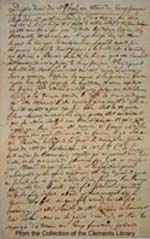Miss Jenny
August 15, 1781 -- Baron Ottendorf
to Sir Henry Clinton
 Baron
Ottendorf was a German mercenary who began fighting in the Revolutionary
War on the side of the Americans. After Washington relieved him of duty
in 1777, Ottendorf joined up with the British army under the leadership
of Sir Henry Clinton. In this letter, Ottendorf took the deposition of
a woman spy who has infiltrated the French armies fighting on the American
side. Nothing is known of Miss Jenny's personal life or professional career
in intelligence gathering, but her spying expedition played an important
role in the British troop’s movements in the late summer of 1781.
Earlier in the spring, Sir Henry Clinton learned from his spy network that
American troops, under the leadership of General Washington, were planning
to meet up with Rochambeau’s French troops, cross the Hudson River and
attack the British in New York City. Clinton and his men nervously
watched the American and French armies’ movements hoping to learn of Washington
and Rochambeau’s strategies. In August of 1781, French and American
troops crossed the Hudson River and settled near Tappan where New York
militiamen were mobilizing.
Baron
Ottendorf was a German mercenary who began fighting in the Revolutionary
War on the side of the Americans. After Washington relieved him of duty
in 1777, Ottendorf joined up with the British army under the leadership
of Sir Henry Clinton. In this letter, Ottendorf took the deposition of
a woman spy who has infiltrated the French armies fighting on the American
side. Nothing is known of Miss Jenny's personal life or professional career
in intelligence gathering, but her spying expedition played an important
role in the British troop’s movements in the late summer of 1781.
Earlier in the spring, Sir Henry Clinton learned from his spy network that
American troops, under the leadership of General Washington, were planning
to meet up with Rochambeau’s French troops, cross the Hudson River and
attack the British in New York City. Clinton and his men nervously
watched the American and French armies’ movements hoping to learn of Washington
and Rochambeau’s strategies. In August of 1781, French and American
troops crossed the Hudson River and settled near Tappan where New York
militiamen were mobilizing.
 According
to this letter, Miss Jenny moved boldly through the French and American
troops, meeting their first guard near Kingsbridge. The guard took
Miss Jenny back to the French camp where he tried to force his amorous
attentions on the female spy. Miss Jenny managed to escape his clutches
and continued to claim that she and her seamstress mother were looking
for her father who had gone to France from Canada six years ago. However,
French officers were naturally suspicious and did not believe Miss Jenny’s
story. She was suspected of being a spy and brought before Rochambeau
and other French officers. After questioning Miss Jenny to no avail,
Rochambeau sent Miss Jenny to General Washington (about two miles west)
where she was held for two days. Miss Jenny stuck to her story during
the two days of intense questioning and was finally returned to the French
camp. The French officers cut her hair in punishment and led her from the
camp with orders never to return. In the eighteenth century, it was rare
to punish a woman by hanging or imprisonment for spying partially because
women
were often regarded as more a nuisance than a real threat since they were
not believed intelligent enough to understand military strategies.
According
to this letter, Miss Jenny moved boldly through the French and American
troops, meeting their first guard near Kingsbridge. The guard took
Miss Jenny back to the French camp where he tried to force his amorous
attentions on the female spy. Miss Jenny managed to escape his clutches
and continued to claim that she and her seamstress mother were looking
for her father who had gone to France from Canada six years ago. However,
French officers were naturally suspicious and did not believe Miss Jenny’s
story. She was suspected of being a spy and brought before Rochambeau
and other French officers. After questioning Miss Jenny to no avail,
Rochambeau sent Miss Jenny to General Washington (about two miles west)
where she was held for two days. Miss Jenny stuck to her story during
the two days of intense questioning and was finally returned to the French
camp. The French officers cut her hair in punishment and led her from the
camp with orders never to return. In the eighteenth century, it was rare
to punish a woman by hanging or imprisonment for spying partially because
women
were often regarded as more a nuisance than a real threat since they were
not believed intelligent enough to understand military strategies.
However, since women of the time rarely cut their
hair short unless they were ill or disgraced, the French publicly humiliated
Miss Jenny.
Despite her ordeal, Miss Jenny successfully returned
to the British camp and reported all she had learned to Baron Ottendorf.
She reported that the American troops were ready to advance and that General
Washington was reportedly planning on attacking New York City in two places.
Based on Miss Jenny’s and other spies’ reports, Clinton decided to keep
his troops in New York. However, just days after Miss Jenny left
the French camp, Rochambeau received a letter from the Admiral of the French
navy, Comte de Grasse, announcing that he was bringing twenty-nine ships
and three new French regiments to Chesapeake Bay. The American and
French armies decided instead to use the French ships to transport their
men from Chesapeake Bay to attack General Cornwallis’ troops in Yorktown.
The surrender of Lord Cornwallis in Yorktown, while Sir Henry Clinton and
his army remained in New York, led to Sir Henry Clinton’s disgrace and
the eventual end of the Revolution.
Previous Story |
![]()
|
|
|
|
Letters | Stories | Methods | People | Routes | Timeline | Home
Clements Library | Sir Henry Clinton Collection | Teachers' Lounge | About the Project | Bibliography